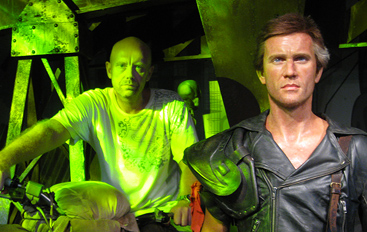How to Get Fit for Complete Beginners
Physical fitness is a vitally important aspect of prepping — and one that's too often neglected. I've been guilty of this myself at times, and especially so in 2018. Mainly just because I was distracted by having so many other things to do. And got slack. I'm paying the price for that right now — as my physical health has significantly declined, especially over the last few months.
This decline in my health (which I'll describe in more detail later) has really caused me to pay attention. To the fact that I must build my physical capabilities back up again, and really stay committed to that. As if my life depended on it. Which it does, since it's one of my two greatest areas of weakness that would be a serious obstacle to me surviving a collapse of society.
This page contains advice on how almost anyone can get fit and stay fit. Not fit like an olympic athlete — but fit like someone whose body is capable of performing physical tasks for hours at a time, almost every day (essentially like a full-time physical job). As would be required for living a basic low-tech life after the collapse of society.
Despite this being a prepping website, and therefore having prepping as the end goal, the information on this page can be read by anyone who wants to learn how to get fit, and especially by those with little previous knowledge or experience of fitness and exercise.
It's one of those "If I can do this, (almost) anyone can do this" pages. Since for most of my childhood I was very unfit, very uncoordinated, and generally totally awful at sports and any fitness-related activities. As a child and teenager, I was so unfit that I never imagined I'd ever be even remotely close to being able to achieve the things I did as a young adult. Which were nothing world-record-breaking — but I did achieve a quite respectable level of fitness and physical ability.
In my twenties and the beginning of my thirties, I could walk all day almost nonstop without getting tired or feeling like it was an effort, easily run ten kilometres nonstop, bike for tens of kilometres, swim a kilometre nonstop, and perform manual labour such as concreting. If you've never done concreting — wet concrete is very, very heavy and the work is very physical. And you can't stop until it's finished, because it's a race to get everything done before the concrete sets. It was a whole entire other universe of fitness away from the unfit life of my primary and high-school years.
After that ten-years-long healthy and fit stage of my life, due to health complications, things went into a big decline... Which I'm still recovering from.
Some of the things I have experience of (and will write about) include failing miserably at sports (and anything to do with fitness) at school, how I recovered from that state, jogging, cycling, swimming (including how I learned to swim), martial arts, going to the gym, weightlifting, pilates and yoga, specific exercises tailored to particular conditions (especially low back problems), physical (including muscular) illness, and recovery from that.
I absolutely need to treat fitness as one of my very highest priorities in life — and never forget it. If I regularly and consistently and gradually work on my fitness constantly, meaning every single day, I should be able to recover, and be fit again. Perhaps even similar to how I was in my twenties. Perhaps, even ahead of that — potentially — since even in my twenties I wasn't 100% dedicated to this as a top priority (other than for short periods occasionally).
Note the general disclaimer that nothing on this website counts as qualified or official advice. I'm just telling my story and my personal opinions of things. Which may or may not apply to anyone else's particular situation. See your medical practitioner before beginning any exercise program. Any use to which you put this information is at your own risk.
Using Pictures as Motivation / Inspiration
For prepping, you definitely don't need to look as built, and especially not as defined (i.e. having a very low body fat ratio that shows up your muscles) as the model in the cover photo above. In fact its better to have more body fat than that (but still to be fit and strong). In a crisis/collapse environment, where food is in short supply, and fat is the hardest of the three essential "mega" nutrients to obtain (the other two are protein and carbohydrates a.k.a. carbs) — you don't want to already have extremely low body fat before you even begin trying to find it without any shops to buy fat-containing foods from.
Note that this is absolutely not an excuse to allow yourself to become a "lardbelly" couch potato. It just means you don't have to spend a massive effort severely cutting back your diet, while also training hard, just to get "ripped" (i.e. have very low body fat and very defined musculature).
I chose that cover photo because in our current society where food (and fat) is plentiful, this is the type of body that most people find the most attractive / aesthetically pleasing. Which makes it very good to use as motivation.
In fact, it's a really good idea to look for and collect pictures (online, or from printed magazines, etc.) of people with the body shape you'd like to have. Or any pictures that convey an image of fitness that appeals to you, and motivates you. And then look at them regularly for inspiration.
Search Google Images for ladies
You can tailor the search terms to find what you like the best. Most women don't want to (nor need to) become super muscled, and most guys (myself included) don't find super-muscled women, e.g. professional female bodybuilders, very attractive. Most women prefer guys with big muscles, but not the absolutely massive ones like professional bodybuilders have (and which are more of a niche appeal). So I was trying to cater to that with the search terms in the links above.

Many women prefer to focus on core strengthening, whole-body fitness, and cardio work — rather than building huge biceps. Photo by Nayana Thara k / flickr.
If I Can Get Fit, (Almost) Anyone Can Get Fit
Here's some of my history and how I began, as a very unfit child and teenager:
Primary School
The first time I realised I was physically far behind the other kids was in year one. It was the first time I did gymnastics. Like forward rolls on the mats, and things like that. I was about as good at it as if you picked up a block of wood, and threw it on the floor, and told it to do a roll. I could do nothing. Not one single thing. It was the first time I can remember being not only significantly behind the other children (I was far ahead of my age academically), but utterly incapable of even coming close to what the other children could do.
Also in year one we did a lot of dancing (for some reason it was usually to Abba songs). I was in a composite class with more than one teacher. My teachers noticed that I was behind with dancing too. Not so much in terms of rhythm (which I've got) but in terms of not being able to move my body properly. They gave me extra exercises to do, like getting me to slowly walk along balance beams and things like that.
Year two was okay in terms of sport (or lack thereof). It was a different school in a different area. I don't remember doing gymnastics. We did do something called "gross motor", which I remember really struggling with.
In year three were my first swimming lessons. They threw me (literally it was more like they told me to jump) into the medium-size pool. I swallowed water and they had to fish me out. I never made it out of the lowest group. I didn't learn to actually swim until I was 23 years old when a girlfriend (who happened to also be a mermaid) taught me. I'm sure she was a mermaid because she could swim 6 kilometres and only stopped when she ran out of time, and had other things to do — but she wished she could stay in the water.
The rest of primary school, I just completely sucked at sport in general.
High School
In Australia, high school starts in year seven. P. E. (physical education) was a separate subject. I attended the classes about half the time in year seven. For sport I chose options like chess, Dungeons and Dragons, and music. Much of the time was spent just hanging around and talking. All through high-school, during sport I never once did anything that would remotely come close to counting as an actual sport.
In year eight I did P. E. exactly four times. In year nine, just once. And only because Mum arrived at school in the middle of that day with my sports uniform — which made my standard excuse of "I forgot my gear" inapplicable. In year ten I did P. E. three times. After year ten, sport and P. E. were optional — so I did neither of them again.
Most weeks the P. E. teachers made me "write lines" for punishment. Nearly always, we just had to write just the word "gear", over and over, and over, for however many pages it was (I don't remember exactly). I guess they weren't English Literature teachers. Since I did it for perhaps an hour nonstop, nearly every week, for three years — I became quite skilled at writing the word "gear". I've never thought of this in my entire life, until editing this page on a prepping website — but perhaps God wanted to really impress on me that gear is something important.
After much experimentation, I learned that it was best to sticky-tape three pens together (in a straight line, not a triangle) to write much faster. Three was optimal. Any more than three was too cumbersome and slowed things down. There were a few other habitually P. E.-shy kids, but none more so than me. Sometimes I finished early enough that I wrote lines for other kids and sold the completed lines to them. Despite my physical failures I was still developing skills — like making improvised tools to increase output and efficiency, and practicing negotiation and trading — these are all good things which are useful for prepping.
The school invited me into the main office for a very serious meeting about this issue at least once. They threatened to revoke my School Certificate over it. (I mean my nonattendance at P. E., not my triple-pen shenanigans). They asked me why I didn't do it. I just said I didn't know. Other than feeling embarrassed about my lack of fitness, I honestly didn't know. My body just seemed to be completely incapable of doing those things.
One of the few times I did P. E. we did hurdles. I knocked over all ten of them. I'm 6 foot 2 (or 3) as an adult, and I was quite tall for my age back then. At age fifteen I would have been six feet tall, or very close to it. I should have been able to step over them without even jumping. But I knocked over every single one — every time I tried.

The dreaded hurdle track. In high-school I couldn't jump over even one of these without knocking it down. Photo by U.S. Air Force / Karen Abeyasekere. From left, “Batman,†(Master Sgt. Thomas Wagner, 100th Maintenance Squadron first sergeant) takes on Col. Christopher Kulas, 100th Air Refueling Wing commander, in the hurdles race May 10, 2013, at a post Unit Effectiveness Inspection celebration on RAF Mildenhall, England. Team Mildenhall members took part in a formation run along the taxiway and perimeter road, before enjoying a barbecue and sports challenges.
I chose the particular photo above because we ran over grass, and there's very few free online photos of people jumping hurdles over grass. And also because “Batman†has the same hair as me, and, when I was very young — before I learned that my body did not move like the other kids — I had a Batman suit. And I have very happy memories of that time of my life. So “Batman†makes a good hurdle-jumping role model for me. It's good to look for photos that demonstrate things you've failed at in the past, that you want to succeed at — which have particular features that help you to imagine that you're in the photo yourself, succeeding.
Other than asking me why I didn't do P. E. (even after serious threat of losing my School Certificate), apart from my year-one teachers, no-one ever tried to help or intervene. Such as by hinting or suggesting I might be able to improve, or taking me for any kind of professional evaluation of my lack of physical capabilities. I got the impression that (other than meeting the minimum requirements to not have my School Certificate revoked) my parents weren't that keen on me doing sport or anything too physical anyway. The reasoning mainly being that I might have damaged "that precious brain of mine".
In the end the school was quite kind to me. Since not only did I not lose my School Certificate, but I got a D grade for P. E. Not D for Distinction, but D as in A, B, C, D, and E. With E being the lowest grade possible. They didn't give me the lowest grade. Which seemed very generous to me. The School Certificate covered work done in years nine and ten. I'd only even attended P. E. four times in the entire two years. And performed miserably poorly during all four of those times. Overall, I doubt that anyone short of being literally crippled could have performed any worse than I did.
So that's what I mean by "If I can get physically fit, almost anyone can get physically fit".
Ten years after that I was a high-achieving physics student at university. Occasionally when I told people what I did, they would say things like "Wow, no way — you don't look like enough of a nerd. I thought you'd be in the Army or something". Considering the background I came from — as you've just read above — that was about the biggest compliment anyone could have possibly given me. And which, because of the way I grew up, I valued more highly than praise for my academic achievements.
How Did I Even Begin to Improve?
Things improved for me massively as a young adult. I was about 22 when I decided to start to get fit. A lot of things were different in my life. I'd mostly given up drinking. I was drinking like a normal non-religious 22-year old — with occasional big nights out, and semi-regular nights of having a few (as in a few, not 20) drinks with my guy friends. Not drinking like an alcoholic, not almost every day, and not enough to keep me out of the full-time workforce — as I had been in my first years out of school.
I saw myself as being on a path of self-improvement, and I'd already seen a lot of improvement in other areas of my life (e.g. drinking, socialising with the opposite sex, and being able to hold down a real job). That gave me the idea that perhaps I could even improve myself physically, too.
I'd read a lot of motivational books. Especially "Think and Grow Rich", which I read six times from front to back. And highlighted lots of the parts I liked with a pencil, as the book said to. Ever since then, even today, I highlight parts of books with a pencil — and that was where I first got the idea. I find it better than using a highlighter, since there's a lot more options to make some parts really stand out, and other parts only slightly highlighted. Like lightly underlining, heavy/thick underlining, drawing a box/loop around the sentence or the whole section (or both), and/or shading in the whole sentence or box/section of text. Also drawing asterisks and arrows and other things on the sides of the pages.
I carried Think and Grow Rich (and other motivational books) around with me everywhere (e.g. on the train), and flicked through them, reading the parts I especially liked over and over. These books first gave me the idea that it was possible to improve my current and previous state.
Oddly enough, I read many years later that the book "Think and Grow Rich" is probably a fake. Meaning that the author had no idea how to actually get rich, and much of the stuff (especially the interviews and comments by other extremely rich people) he just made up out of his own imagination. You can research it yourself (i.e. the life of the author), but based on several contradictory opinions, it seemed to me that he was more likely to have been a genuine scammer than a genuine success guru.
I never did grow rich myself (nor even close), so perhaps I should have picked a different book. It did sound very impressive though. And it did inspire me to doing things I wouldn't have otherwise thought I was capable of doing. I've read at least three full-book-length biographies of Bill Gates (who's obviously a genuine self-made rich person), plus at least one book of advice written by Gates himself — and they didn't teach me the magical keys to financial riches either.
Around age 21-22 I started buying fitness literature, such as the "Men's Fitness" style of magazines. I had a few very small books (almost pamphlets) by Rocco Oppedisano, a bodybuilder. Most of his books were about how to get started with weight training. Also around that time I saw a movie, which I forget the title of, where a guy goes from "zero to hero" in terms of fitness.
All of that combined turned out to be enough to convince me, for the first time in my life, that perhaps I really could improve myself physically.
Young Adulthood
I began with jogging. I was 22 years old, or almost 22. I went into one of those athletic-themed shoe stores and bought a proper pair of name-brand running shoes. I think they were Nike from memory. I was quite anxious about even walking into the store. I was imagining they'd laugh at me (at least on the inside) in the way that I'd often been laughed at in my school years over my lack of physical fitness. But they were highly-trained retail sales professionals, and were completely courteous and helpful. I didn't at all get the feeling they were holding back their laughter.
At first I could only jog 500 metres, slowly, down a gentle hill, and that was plenty enough. After months of gradually increasing my distance, I was regularly jogging 10 kilometres about once a week. Usually from North Belrose in Sydney to St. Ives Oval, once around the oval, and back home. According to my car speedo that trip was almost exactly ten kilometres. On foot it took me about an hour.
That year I went in the "City to Surf", a 14 km fun run from the city of Sydney to Bondi Beach. I jogged (not walked) basically the whole way, with a couple of very short water stops and walking rests, and got a time I was very happy with. It was about 90 minutes. I would have been happy just to finish at all.
Not long after that I borrowed a bicycle and started riding again, which I hadn't done much of since a child, and never very long distances or very athletically or fast, and not at all for several years. Before long I bought my own road bike and I was commuting 17 km each way from Belrose to Hornsby, and doing similar or longer-distance rides around the mid-Northern Beaches area of Sydney where I lived at the time.
More to follow later...
Visiting the Gym for the First Time
Coming soon... I was 23, almost 24, when I first went to the gym. I'll describe this soon...
Write something about doing the tasks you'll really be doing like digging, carrying loads, etc. ************
Why the Gym?
If you don't have a preference for (or interest in) any particular sport or activity, the gym is probably the best option. Assuming there's one close to you, which there would be for almost everyone in an urban or suburban environment, but perhaps not if you're rural.
The gym has the greatest range of different activities, and body movements, and muscles worked. There are many different "cardio" machines, a huge variety of weight machines and free weights, usually many different kinds of group class activities you can do, personal trainers to instruct/assist you as required, and sometimes a swimming pool too.

The weights section of a U.S. Air Force gym at Al Udeid Air Base, Qatar. The complicated-looking gym equipment can feel intimidating at first, but you get the hang of it quickly. Even at an Air Force gym this isn't rocket science. And you can still have a productive workout knowing only 4 or 5 basic exercises. Photo by U.S. Air Force / Tech. Sgt. Jeff Andrejcik.
The source credit link for the picture above points to a good page about gym etiquette.
Audience
Some gyms are very different to others in terms of the kinds of people who go there, and how intimidating this makes the overall atmosphere. My first gym was at a university, and it was friendly, and really good. Mostly everyone there was a normal looking uni student, except a bit (and a few of them a lot) fitter than average.
There are some gyms where everyone looks like Arnold Schwarzenegger. And others where there's lots of normal looking and/or older and/or overweight and/or obviously unfit people, plus a few obviously very fit ones, and with a very friendly and non-competitive atmosphere.
So if you try one, and hate it, don't give up — it might just be that particular gym isn't the one for you.
Sweating
Some people, especially women, are severely embarrassed about this. There's no need to be. Especially in a gym. It's a gym. Meaning that it's expected. You're not having a five-star dinner with the Queen.
Most gyms have very strong air conditioning, which not only cools the air but dehumidifies it (i.e. dries it out) so that you sweat much less than you'd think you might. It makes your sweat evaporate like condensation evaporates from the inside of your car windscreen when you turn on the air conditioner.
Many women are embarrassed by guys seeing them sweat. There are always women-only gyms. I think many women imagine sweating as something unattractive to men, where most men in fact think the opposite. And find it attractive (assuming she's someone they find attractive to begin with). Perceptions of fashion and appearance are a lot different for most men vs. women, at least traditionally. Traditionally, women stress a lot about how they will look, and what to wear. I read once that most men would rather look at a woman wearing a skin-tight actual potato sack than a classy $5,000 dress. I don't think that's 100% true, but it's more true than most women probably realise. Sweating (and especially if you're obviously exercising) is absolutely nothing to be concerned about in terms of your appearance.
Social Anxiety
I have some amount of social anxiety — which is becoming an increasingly common problem for people in modern society. But (after I got over the original shyness about it) I actually find I prefer to work out at the gym than at home. I've had my own weight bench and free weights at home at times in the past. It seems easier at the gym, with the other people, to stay motivated. And I find the workouts are much more enjoyable and less tedious than at home by myself.
General Principles
This section is brand new will be edited soon.
- Today is the first day of the rest of your life.
- Unless perhaps you have a severe incurable degenerative illness, you can always improve from where you are now. And usually (and especially if you're a beginner), you can improve a lot from where you are now. Don't ever think that "you're just not the sporty type" or that fitness is something that's not for you. This was my second biggest initial obstacle to becoming fit.
- Don't be embarrassed at the level you're at when you start, no matter how unfit you may be or how much you can (or can't) do. This one thing was my biggest obstacle, and it was why it took me until I was 22 to start getting on top of physical fitness.
- Start small and work up gradually, often very gradually is best.
- Be careful not to overtrain, especially when you're starting out.
- Keep gradually increasing your output. Also, this is optional but you can gradually keep adding new activities.
- Remember the end goal as a prepper is to be doing certain types of outdoor activities, so keep the end goal in mind too, and not just the fitness goals that most of us in modern society usually think about. Though using the familiar, everyday, modern goals for motivation and also for training is still a very good idea for probably nearly everyone who's grown up in modern Western society.
Eventually I'll write more about these end goals, and how they can be more specifically trained for. Here's an example of one such end-goal.
External Links
YouTube search results for First Visit to the Gym. Some really good videos here.
YouTube search results for Beginners How to Get Fit. More of a variety of content than above link, much of it is also very good.
Stay Tuned
More to follow on this page soon...
Related articles
Prelude to Catastrophe The world had been teetering on the edge of conflict for years. Political tensions, economic rivalries, and territorial disputes had escalated, creating a global atmosphere of distrust and fear. Nations fortified their borders...
Surviving the collapse of modern society would require a mix of practical skills, knowledge, and mindset. Here are some of the most important skills: Basic Survival Skills: ...
Nuclear Winter
A nuclear winter is a theoretical scenario that would follow a large-scale nuclear war, characterized by severe and prolonged climatic cooling and other catastrophic environmental effects. Here's what it might be like: ...

 Welcome to Prepping.com.au, the new web magazine.
Welcome to Prepping.com.au, the new web magazine.
 What is Prepping? A guide for normal people to get started.
What is Prepping? A guide for normal people to get started.
 How to use this site. When all else fails, read the instructions.
How to use this site. When all else fails, read the instructions.
 This is your mission, should you choose to accept it.
This is your mission, should you choose to accept it.









